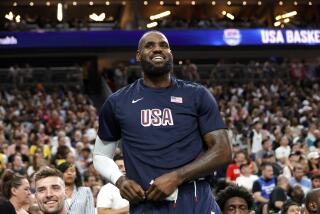Opening eyes to Darfur
- Share via
The faces haunt Ira Newble, their silent anguish sometimes drowning out the joyous noise of a Staples Center crowd, their looming presence a jarring reminder that genuine do-or-die struggles in life don’t occur on a basketball court.
Newble, 33, is usually stuck on the Lakers’ bench, but he has plenty of positives to focus on. The 6-foot-7, 220-pound forward, with eight years in the league, went from being a free agent two months ago to a roster spot on one of the teams favored to win the NBA title.
But even such good fortune can’t dull the pain of having seen young children draw pictures of their parents being murdered, or erase the horror of hearing a young woman talk about being raped night after night. And it doesn’t dim the image of a young man whose eyes were gouged out.
Newble saw all that and more last summer when he made a trip to a refugee camp in Chad to see victims of the conflict in neighboring Darfur.
“The stories are so saddening,” Newble said. “I’m from Detroit and I’ve seen some of the worst things there and in other parts of this country, but it doesn’t begin to compare to the living conditions of the people from Darfur.”
The Darfur region, located in western Sudan, has been engulfed in a devastating conflict for the last five years. Government troops and militia units have been battling rebels opposed to a government they say persecutes the non-Arab population. The government-backed militia units have targeted civilians, and an estimated 200,000 to 400,000 have been killed, with some 2.5 million people displaced.
Darfur wasn’t even a blip on Newble’s radar screen until January 2007. He was on the way to a morning shoot-around as a member of the Cleveland Cavaliers when he picked up a newspaper with a story about an English professor, Eric Reeves, who was working for relief for Darfur from his hospital bed despite suffering from leukemia.
“I was wondering how come I didn’t know anything about Darfur,” said Newble.
He contacted Reeves, who gave Newble a crash course on Sudanese politics. Through his agent, Steve Kauffman, Newble met Hunter Payne, founder of Aids Still Required, a charitable organization devoted to humanitarian relief. Newble learned China is a major trading partner and is a supplier of weapons to the Sudanese government. He wrote a letter of protest to the Chinese government.
“How could they be a legitimate host of the Olympics,” said Newble, “while underwriting genocide and war?”
Even as the Cavaliers were about to begin the playoffs last year, Newble felt Darfur couldn’t wait.
“I realized a lot of my teammates were like I had been,” said Newble. “They had no clue what was going on in Darfur. So I compiled a packet of information for each of them and, with Coach Mike Brown’s permission, I addressed my teammates in the locker room one day after practice. I asked them to read the information and to then come back and discuss it with me if they had any questions.”
All the members of the team, except LeBron James and Damon Jones, signed the China protest letter, Newble said.
“They didn’t do so because of shoe deals,” said Newble, “and in LeBron’s case, he has to be careful what he puts his name on. That’s OK.
“He respected what I was doing and I respected his decision.”
--
Cavaliers’ James, Nike explain positions
James’ shoe contract is with Nike, an Olympic sponsor. Criticized for not signing the letter, he addressed the issue Sunday on ESPN.
“I didn’t sign the letter right there and then, so now, it’s blown up,” James said. “No one heard my side of the story. . . . For me to try to create awareness of the situation that’s going on in Darfur and other places, for me in the position I am, I should speak on it and I’m going to speak on it. . . . We’re not talking about contracts here. We’re not talking about money. We’re talking about people’s lives being lost, and that means a lot more to me than some money or a contract.”
James told the network he hopes he and his Olympic teammates can find a way to express their concerns about Darfur.
The letter Newble sent a year ago expressing his concerns received no response from Chinese officials.
Undeterred, he next decided to manufacture bracelets to symbolize the suffering in Darfur. Newble asked Nike, which also had him under contract, to produce the bracelets.
“I got a response from Lynn Merritt of Nike,” said Kauffman, “that I will never forget. Referring to Ira, Merritt told me, ‘What a pain in the . . . he must be to the Cavs, bringing this into the workplace. That would be like me coming into your place of employment and asking you to join the Islam Nation.’ I was horrified. I couldn’t believe what he had just said.”
Newble and Nike subsequently had a mutual parting of the ways.
“As far as Mr. Newble’s separation from Nike at his own volition, it was unrelated to any external issues,” said Vada Manager, Nike’s director of Global Issues Management, in a statement. “We respect his choice and advocacy. While many Nike athletes are involved in many causes global and domestic, [we] cannot financially support each idea or cause that is presented to us. Many athletes choose to support such efforts from their own proceeds and we can respect those ideals without underwriting each cause.”
--
Hoping U.S. team will acknowledge crisis
Last August, Newble took a trip with actress Mia Farrow and several others.
“I realized I needed to go to the Darfur area, get my feet on the ground and see what was going on,” he said.
“We spent three days in one camp in Chad and two in another. I saw kids, ages 8 to 13, drawing stick figures of women running, holding babies, getting shot in the back by soldiers. They drew pictures of helicopters dropping bombs. There was red scrawled everywhere to show blood. These were their mothers and sisters, family members and friends they watched die in front of them.”
Newble tried to remain stoic while listening to these stories. “One individual said to me, ‘I’m telling you this because I believe you are going to go back and speak about it so we can get help from the international community.’ ”
Upon his return, Newble hugged his own two kids, put a picture of one of the little girls he had met on his computer screen and cellphone and began a campaign to spread the word among fellow NBA players.
Eleven players, including six Lakers, filmed public-service announcements about the Darfur crisis. Tracy McGrady made a trip to Chad. Luol Deng and Manute Bol became involved. Newble treated 15 teenagers from the war region now living in Cleveland, a group known as the Lost Boys of the Sudan, to a trip to last year’s NBA Finals.
“Ira is the progenitor in the NBA,” said Payne. “He has spawned a movement among the players.”
While not advocating a boycott of the 2008 Olympics, Newble would like to see members of the U.S. basketball team acknowledge the Darfur situation.
Kareem Abdul-Jabbar, now a Lakers assistant coach and certainly no stranger to social activism, is impressed by Newble’s efforts.
“I think it’s great he has this awareness and cares that much,” Abdul-Jabbar said. “That says something about who he is. He’s looking at things in the larger world.”
Newble is considering another trip to Chad this summer. “I always feel like I haven’t done enough because nothing’s changed,” he said.
--
More to Read
All things Lakers, all the time.
Get all the Lakers news you need in Dan Woike's weekly newsletter.
You may occasionally receive promotional content from the Los Angeles Times.






